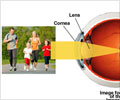A special contact lens can slow the progression of myopia. In certain cases it could even halt the short sight problem altogether.

"The race is on around the world to develop clinical techniques to deal with the myopia epidemic in East Asia," says Professor Helen Swarbrick, who heads the UNSW Research in Orthokeratology (ROK) Group.
"Our research has demonstrated conclusively that OK is effective, at least in the short term, in stopping the eye growth that causes myopia progression."
It is unclear why the incidence of myopia has risen so dramatically, especially in East Asia.
In Taiwan, as many as half of all children in kindergarten wear glasses and by the age of 18 about nine out of 10 Taiwanese are myopic, Professor Swarbrick notes.
"It's been suggested that genetic factors, dietary change and a surge in people doing more close work – that is, reading, watching TV and looking at computer screens – are involved but we don't really know.
OK lenses have been in use for many years and are mainly used for correcting low to moderate myopia, or short-sightedness.
They work by gently reshaping the front surface of the eye, correcting the refractive error.
Unlike surgical techniques, the correction achieved this way is reversible - simply by not wearing the lenses.
"The effect is dramatic," says Professor Swarbrick.
"After wearing the lens for an hour and then removing it, many short-sighted people can read a further two lines down on the standard optometrists’ vision chart.
“After a single night of OK lens wear, vision can improve by as much as six to seven lines.
"Anecdotal evidence and a small number of research findings had already suggested that OK lenses might also slow the progression of myopia in children – indeed, thousands of children in East Asia are wearing them specifically for this purpose.
“But randomised clinical trials were needed to confirm this early promise."
Among several studies under way worldwide, the ROK team devised a novel "contralateral" experiment in which myopic children were monitored while they wore a normal contact lens by day in one eye and an OK lens during sleep in the other.
After six months, the lenses were swapped to the other eye.
From an initial group of 32 children, 24 completed the full-year trial.
Although the findings have been presented at major international conferences, they have not yet been published in the scientific literature.
The results were compelling: the study showed plainly that for most children wearing an OK lens inhibited the elongation of the eye, while the normal day lens did not.
Some children received more benefit than others, although it is not yet clear why.
Professor Swarbrick says further research is needed to determine how long OK lenses must be worn to permanently halt myopia progression.
“We are also investigating whether OK lens designs can be individualised to target optimum myopia control for every myopic child,” she said.
Source-Medindia
 MEDINDIA
MEDINDIA


 Email
Email










